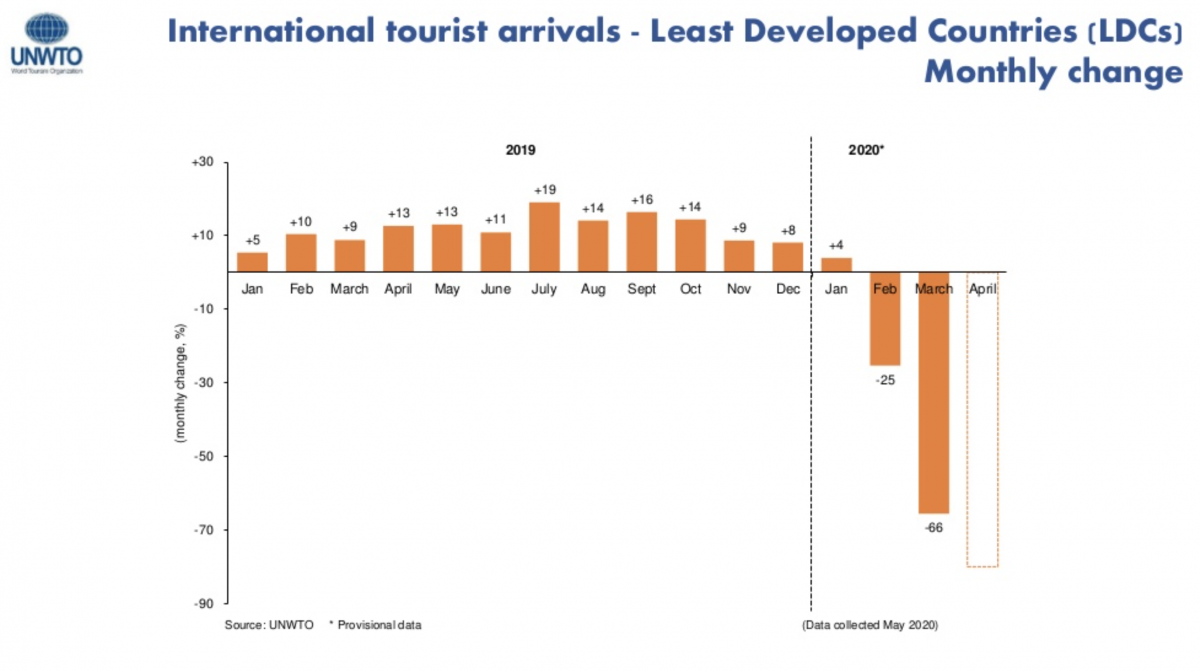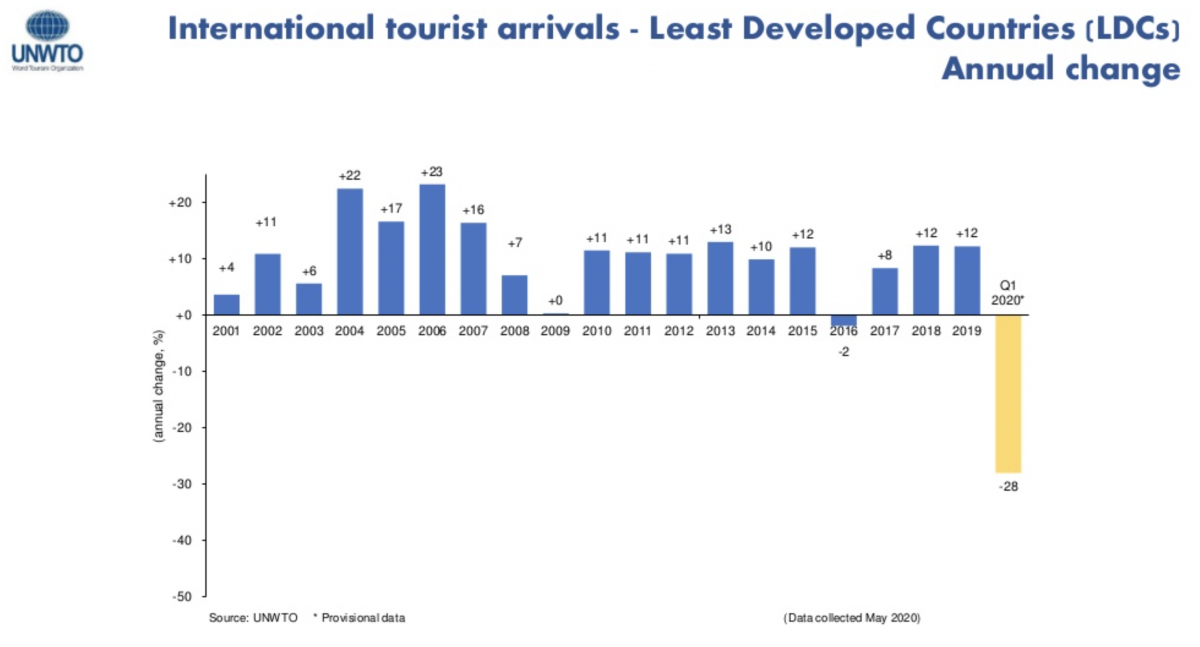Halting of travel devastating sector that is a key driver of growth in the world’s poorest countries
Scenarios by the World Tourism Organization (UNWTO) suggests that tourism could decline by 60-80% this year, completely decimating the sector that is a key driver of growth for the world’s poorest countries.
“The impacts of COVID-19 on tourism are unprecedented. With borders closed, hotels shut down and planes on the ground tourism has come to a total standstill in the last two months,” said Zoritsa Urosevic, Director of Institutional Relations and Partnerships at UNWTO.
“The best-case scenario is a 58% decline in international tourist arrivals if borders start gradually opening in July. This would be the biggest dip in international tourist arrivals in history.”
100% of all world destinations have implemented travel restrictions in the wake of COVID-19, and this means 67 million fewer international tourists up to March 2020, and US$80 billion in lost exports.
Crucial sector for millions
Tourism is one of the largest and fastest-growing sectors in the world, representing nearly 10% of the world's GDP, 30% of global services exports and providing one out of every 11 jobs.
One of our focuses in reopening destinations is strengthening of domestic and intra-regional markets. We think this could help the sector tremendously in the immediate and as we build recovery.
Zoritsa Urosevic, Director of Institutional Relations and Partnerships at UNWTO
Tourism is a crucial growth pillar for least developed countries (LDCs). In 2019, LDCs received 41 million international tourist arrivals – more than double the volume registered in 2010 – and earned US$26 billion from international tourism, or 11% of their total exports.
“Tourism has a very broad value chain. It relies on industries like hospitality, transport and recreation but it also feeds demand in food, arts, design, cultural products and services. This is one of the reasons that it is such an important sector for development,” Urosevic said.
The tourism value chain also provides important direct and indirect employment opportunities for vulnerable communities such as women and youth.
Tourism was also one of the main factors enabling Cabo Verde, the Maldives and Samoa to graduate from LDC status.

Source: UNWTO
Despite all this, tourism is not often a government priority nor a major action sector for donors. Between 2006 and 2013, tourism comprised only 0.09% of Official Development Assistance (ODA) and 0.4% of aid for trade disbursements.
“This has meant that many LDCs have struggled to make the substantial infrastructure and utility investments needed to develop their tourism sector, become more competitive and advance their capacity for inclusive economic growth,” Urosevic said.
Opportunity in crisis
One of the lessons from tourism’s collapse, Urosevic said, is that governments have become fully aware of the importance of tourism to their economies, and the associated socioeconomic impacts, especially when it comes to the millions of jobs that are now at risk.
“This means that we have an opportunity to adjust our focus and step up support to invest in tourism, in particular green investment” she said.

Source: UNWTO
“What is very clear is that this work has to be done right now. We need to help countries survive through the crisis and prepare to receive tourists again,” she said.
The World Tourism Organization has released 23 recommendations for actions to support the tourism sector to bounce back. In LDCs, the most urgent focus has been on supporting tourism ministers to secure financial packages and additional borrowing options for mitigation and recovery offered by the IMF, the World Bank and other International finance institutions.
“We are helping these countries to secure the financial capacity to sustain and support tourism businesses surviving and workers to have a wage, particularly informal workers who are not registered anywhere and need social support to survive,” Urosevic said.
They have also been offering support to strengthen institutions, as well as an integrated technical assistance package covering immediate economic recovery, implementation of protocols to reopen, marketing and digitalization.
I think travellers are going to be different. This crisis has forced many of us to live locally and so we may think more about that when travelling internationally – seeking out local food, local purchases...
Zoritsa Urosevic, Director of Institutional Relations and Partnerships at UNWTO
“One of our focuses in reopening destinations is strengthening of domestic and intra-regional markets. We think this could help the sector tremendously in the immediate and as we build recovery,” Urosevic said.
The tourism sector will definitely bounce back, Urosevic said, because of the deep desire of people to travel and connect with others.
“Just listen to the people around you… everybody wants to go somewhere. Travel has become part of our DNA. We need this dream time and moment of retreat with ourselves, nature and other cultures,” she said.
“But I think travellers are going to be different. This crisis has forced many of us to live locally and so we may think more about that when travelling internationally – seeking out local food, local purchases – and growing the local production of foods and goods for the benefit of everyone, but we will TravelTommorrow!"
-------------------------
For a slide presentation with more information about the topic from UNWTO, please see here.
Header image of women in Nepal - ©Stephan Bachenheimer/World Bank via Flickr Creative Commons Attribution-NonCommercial-NoDerivs 2.0 Generic (CC BY-NC-ND 2.0) license.
If you would like to reuse any material published here, please let us know by sending an email to EIF Communications: eifcommunications@wto.org.



